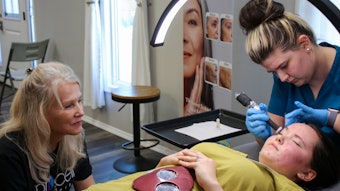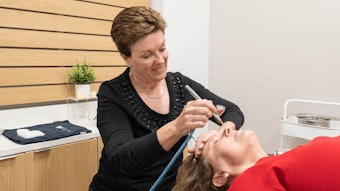
Are you or your fellow skin professionals stressed during the holiday season? Research published by inClinical Psychological Science suggests that helping others may improve both mood and stress.
“Stressful days usually lead us to have a worse mood and poorer mental health, but our findings suggest that if we do small things for others, such as holding a door open for someone, we won’t feel as poorly on stressful days,” explains study author Emily Ansell of the Yale University School of Medicine.
Ansell and co-authors Elizabeth B. Raposa (UCLA and Yale University School of Medicine) and Holly B. Laws (Yale University School of Medicine) conducted a study in which people used their smartphones to report on their feelings and experiences in daily life. A total of 77 adults, ranging from 18 to 44 years old, participated in the 14-day study.
The participants received an automated phone reminder every night that prompted them to complete their daily assessment. They were asked to report any stressful life events they experienced that day across several domains (e.g., interpersonal, work/education, home, finance, health/accident) and the total number of events comprised the measure of daily stress. They were also asked to report whether they had engaged in various helpful behaviors (e.g., held open a door, helped with schoolwork, asked someone if they needed help) that day.
The participants also completed a 10-item short-form of the Positive and Negative Affect Scale, a well-validated measure of experienced emotion, and they were asked to rate their mental health for that day using a slider on a scale that ranged from 0 (poor) to 100 (excellent).
The results showed, that not only did the proactive helpers have a better daily well-being, but they had higher levels of daily positive emothion and better overall mental health. They also responded better to stress. While those with lower helping behavior had more negative emotion when confronted with stress, those with higher levels of helping behavior had a lower increase in negative emotion. In other words, they didn't let stress get them down.
“It was surprising how strong and uniform the effects were across daily experiences,” says Ansell. “For example, if a participant did engage in more prosocial behaviors on stressful days there was essentially no impact of stress on positive emotion or daily mental health. And there was only a slight increase in negative emotion from stress if the participant engaged in more prosocial behaviors.”
It is easy to get caught up in to-do lists, taking care of clients, gift shopping and financial management over the holiday season, but don't forget to lend a helping hand. It may just be the extra step you need to maintain your well-being and keep stress levels low.
The researchers note that additional studies will be necessary to determine whether the findings hold across ethnically and culturally diverse populations. A particularly important avenue for future investigation, the researchers say, is to determine whether actively prompting people to engage in more helping behavior can further improve their mood and mental health. “This would help clarify whether prescribing prosocial behaviors can be used as a potential intervention to deal with stress, particularly in individuals who are experiencing depressed mood or high acute stress,” Ansell concludes.










